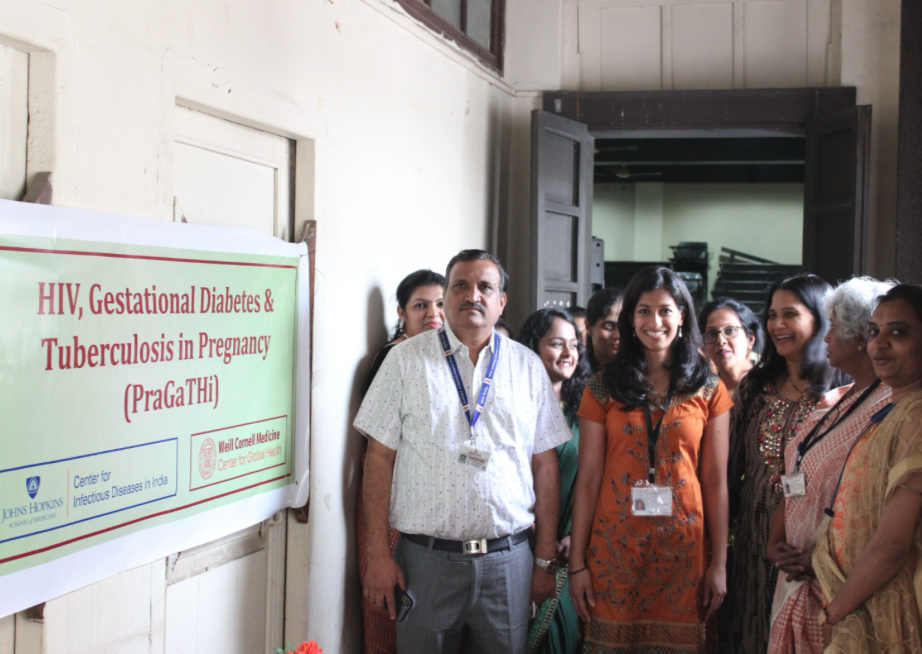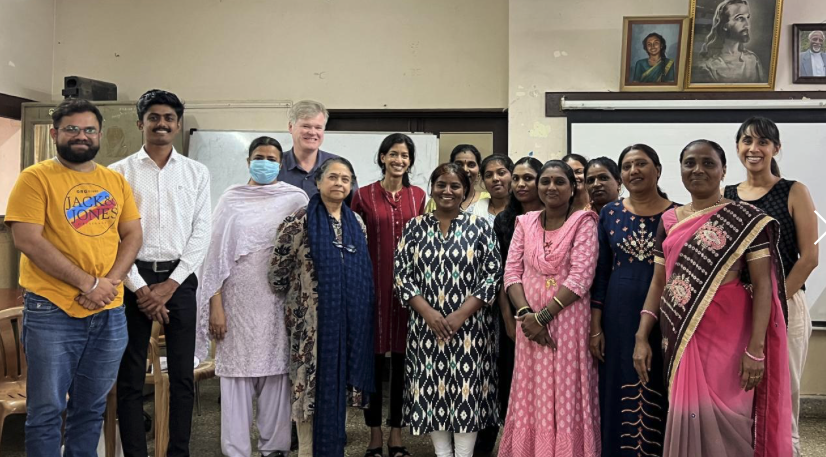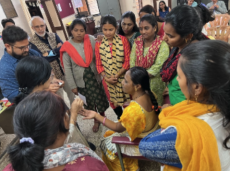Pune, India

Study launch for PraGaTHi study at BJ Government Medical College. In the front row (left to right): Dr. Sanjaykumar Tambe, Dr. Jyoti Mathad, Dr. Nishi Suryavanshi, Dr. Mallika Alexander, Poonam Yadav (study counselor)
Byramjee Jeejeebhoy Medical College
Byramjee Jeejeebhoy Medical College (BJMC) in Pune, India, was founded in 1871 and is among the top medical colleges in India. It is affiliated with Sassoon General Hospital, the largest government hospital in Pune, a city with a population of 7 million. Sassoon is a 1,300-bed public facility that treats underserved populations from the surrounding rural and urban communities. Its 21 outpatient clinics provide care to almost half a million patients, and its maternity ward delivers over ten thousand infants annually. In 2009, BJMC became a partner with the Weill Cornell Medicine Center for Global Health. Their collaboration with Weill Cornell focuses on HIV, gestational diabetes, and tuberculosis in pregnancy.
Deep Griha Society
Deep Griha Society (DGS) is a grassroots organization focusing on community development that was founded in 1975 in Pune, India. It is dedicated to improving the lives of marginalized communities through health care, education, and capacity building programs. DGS specializes in child development and women’s empowerment, for example by setting up financial co-operatives and income generation programs to help women become self-sufficient. DGS is based in three urban and two rural communities, reaching over 70,600 people annually. DGS has been collaborating with Weill Cornell Medicine since 2020, with Dr. Jyoti Mathad working closely with the society since 2001. Their collaboration with Weill Cornell has enhanced community health initiatives, particularly in women's health and infectious disease prevention.

Improving Maternal-Child Health
Weill Cornell Medicine faculty led by Drs. Jyoti Mathad and Puja Chebrolu are focusing on improving maternal-child health in Pune. Examples of ongoing research and training include:
Tuberculosis and pregnancy
A woman faces her highest lifetime risk of contracting tuberculosis during pregnancy and the immediate postpartum period. Dr. Mathad and colleagues are conducting studies to better understand why pregnancy makes women more vulnerable to tuberculosis, which is a leading cause of death in both mothers and young infants. Through this research, they hope to develop tools to identify women at the highest risk for tuberculosis and to provide them with preventive therapy.
Depression during pregnancy
In the United States, about 12% of women develop postpartum depression. In low- and middle-income countries like India, depression occurs more often during pregnancy, rather than after the baby is born. Pregnant women with depression are more likely to commit suicide and develop complications during pregnancy, such as preterm delivery of the baby. Their infants are more likely to have stunted growth and delayed development. Among pregnant women in India, Weill Cornell Medicine investigators demonstrated that the prevalence of depression during pregnancy is 30%. They are now working with colleagues to determine the social and biological causes and to develop interventions that can be provided during routine prenatal care.

CHW training session on how to perform gestational diabetes screening by physicians from KEM Hospital in Pune.
Community Health Workers Study
Gestational and postpartum diabetes levels are rising exponentially in India, yet few women are screened. Working with DGS, Dr. Jyoti Mathad, Dr. Radhika Sundararajan and Dr. Puja Chebrolu are implementing a new care model where community health workers bring gold-standard gestational and postpartum screening to women’s homes. A pilot study showed a 90% uptake of this model. A R01-funded study is expanding this model to 12 slum communities across Pune.
Future Directions
Weill Cornell Medicine physicians are extending their research to include other common conditions that affect pregnant women, including high blood pressure. They are also addressing other women’s health issues, such as sexual violence, and are committed to training more Indian physician-scientists to conduct research in women’s and maternal-child health. Skilled investigators are crucial for the conduct of research on sensitive issues like maternal health, cervical and breast cancer, and gender-based violence. Therefore, Weill Cornell Medicine is planning to provide training to Indian doctors on research methods and leadership skills, with the goal of improving the health of women and children in Pune.
Weill Cornell Medicine Center for Global Health
Center for Global Health
420 East 70th Street, 4th Floor, Suite LH-455
New York, NY 10021
Phone: (646) 962-8140
Fax: (646) 962-0285

